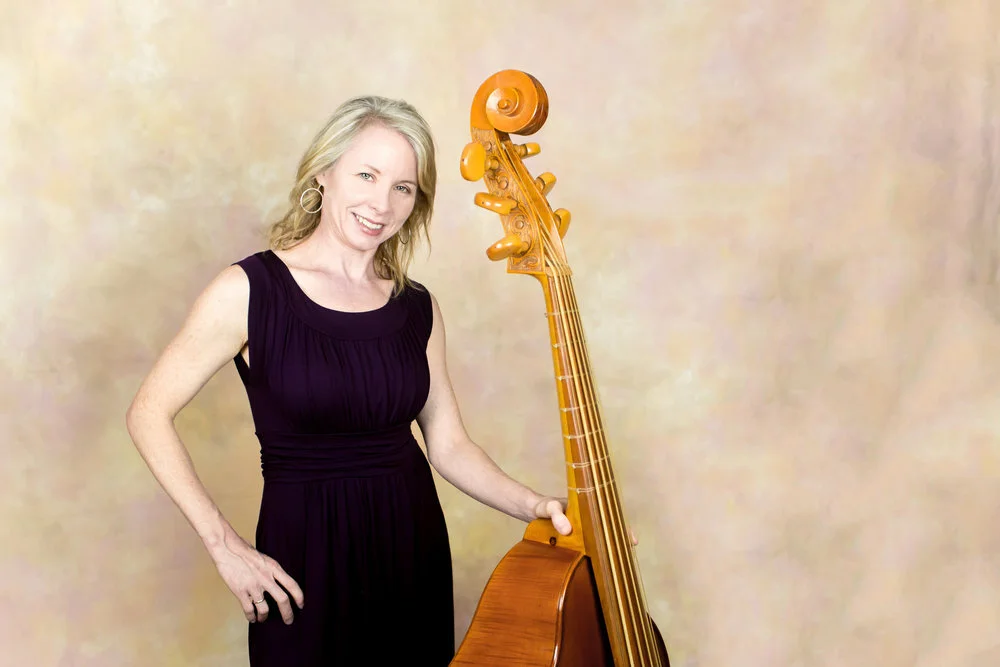I'm Heather, and I have A LOT of double basses.
Baroque for Bach & Handel.
Viennese for Haydn & Mozart.
G violone for 17th-century continuo.
And “modern” for everything else. (Pretty sure I’ve seen a few of those adorable mini-basses around here too…)
I know what you’re thinking.
...And yes, I DO need them all! I’m the principal bassist with the Handel and Haydn Society, a period instrument orchestra in Boston. But I live outside of Philly, where I direct the early music ensemble at Temple University, teach my studio of awesome bassists and gambists, and perform as part of a thriving early music scene. All of this makes me super happy, every day. I don't even mind driving a mini-van.
Here's how I got myself into this situation:
No way could I have imagined my current reality back in the late ‘90s. I'd recently finished my degree program at the Curtis Institute and was freelancing around Philly. My heart was set on a full-time orchestra job, and I'd even advanced in a few auditions. But playing the same excerpts the same way, day in and day out, was starting to get to me.
One day, I inadvertently wheeled my steel strings into a rehearsal set where literally everyone else was a period instrument specialist. For some reason I'd never gotten that memo—but it was totally my lucky day, because they let me stay and play some Beethoven.
Five minutes in and I was SOLD. How did they make the music groove like that?? I just had to know. And the gut strings sounded absolutely glorious. Sign. Me. Up.
I knew right away that I’d need to do some homework to supplement what I’d learned/slept through in music history class. So I set out on a quest to find out about all things early bass. I blew through my meagre savings on summer festivals, lessons, strings, concert tickets, and books. And eventually I decided to get a DMA in historical performance practice.
The best part of the process was learning on the job with experienced players, whenever I could get the chance. The worst part was feeling like I didn’t know what I was doing for a good long time. I had just spent four years in conservatory and a couple more playing professionally. It did NOT feel amazing when I sounded squeaky and clunky in my practice room (THANKS, gut strings!) and I was mortified when it happened in public. But I pushed through, and I’m glad I did.
Here’s what I found out: ANY double bassist can master historical style with hard work and the right approach. Baroque, modern, gut, steel, overhand, underhand, solo, continuo—it doesn’t matter.
The level of bass playing is higher than it has ever been. You just need to learn how to leverage the skills you already have by using historical performance practice techniques and interpretive concepts. My middle-school bass students can apply these ideas to Baroque and Classical music—and so can you.
What does this mean for you and your playing?
When you make musical decisions that align with the historical context of your repertoire, your playing is confident and expressive. You finally feel that you’re making a unique and important artistic contribution. And contractors, audition committees, and your colleagues will take notice when you do. It’s now expected that string players will be able to play early repertoire with some understanding of historical style. If you’re a Classical bass player, you can’t afford to ignore this!
My goal is to help thoughtful and creative modern or period bassists (like you) discover and use historical performance practice to expand their career trajectory through their love of early music. There are so many incredibly joyful ways that can play out! Whether your ambition is to perform Handel’s Messiah on gut strings, solo Bach cello suites at pitch, Classical concerti in Viennese tuning, or Mozart symphonies in a top-tier orchestra, historical style is MUCH closer than you think. And you don't have to dismantle your life to make it happen.
Professional Bio
Heather Miller Lardin is principal double bassist of the Handel + Haydn Society, director of the Temple University Early Music Ensemble, and co-director of the Philadelphia-based period instrument ensemble Night Music. Recent engagements have included Boston Early Music Festival, Tempesta di Mare, Choral Arts Philadelphia, Bach Choir of Bethlehem, Bach Akademie Charlotte, Staunton Music Festival, and Brandywine Baroque. Intensely curious about all things historical bass, Heather designs online and in-person workshops engaging like-minded players worldwide. Her Baroque Double Bass course is available on discoverdoublebass.com. In addition to serving on the faculties of Amherst Early Music and the Viola da Gamba Society of America Conclave, Heather has presented recitals, workshops and master classes at Yale University, James Madison University, and Peabody Conservatory. She makes her home in the Western suburbs of Philadelphia, where she started playing bass in 6th-grade orchestra. When not teaching, tuning, or chauffeuring teenagers, Heather might be enjoying a cozy mystery and a good cup of coffee with her two Maine Coon cats. A graduate of the Curtis Institute of Music, Ms. Lardin holds a DMA in Historical Performance Practice from Cornell University. She performs on a Viennese violone after Stadlmann, ca. 1748 (Oskar Kappelmeyer, 2013), a violone in G after Busch, ca. 1630 (John Pringle, 1993) and a Baroque double bass after Maggini, ca.1620 (Thomas Andres Wolf, 2019).

